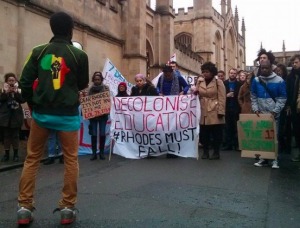This semester, I am taking a class called “Decolonizing Media.” Those invested in decolonizing work acknowledge that colonialism, even after it has been dismantled, continues to deeply impact countries in which colonization occurred.
We are focusing on South Africa, where apartheid fell only recently, in 1994 (the year I was born). Even though the country is attempting to integrate black and white citizens into the same spaces, stark inequality persists. Black South Africans continue to struggle with racism, access to resources, and other instances of disenfranchisement. Aware that attending university is most likely the only way out of cyclical poverty, black students make sacrifices to enroll. However, a hike in fees and the general cost of attending college prevents many black students from completing their degrees. Although black South Africans comprise 86% of the country’s population, only 19% of university students are black.[1] South Africans students, including white allies, have rallied to protest fees and other obstructions of justice.
The South African education systems remain rooted in their history of oppression, racism, and colonialism. Students are pushing for the “decolonization” of curriculum, which involves rejecting a white-washed approach to education. Most university curriculum remains a cache of works by upper-class, white, straight males. By passing only this information on to the next generation of students, the injustice and one-sided perspectives established by the ruling class of colonization is upheld. Students are calling for a greater diversity of not only faculty, but also in curriculum, one that better reflects their lived experiences as a majority but marginalized population in South Africa.
Protests of oppressive symbols and structures is central to decolonization. For example, in 2015, the #RhodesMustFall protest resulted in the removal of a statue of Cecil John Rhodes at the University of Cape Town. A white supremacist, Rhodes was the Prime Minister of the Cape colony at the end of the 19th century. The Rhodes statue was a symbol of the worst part of colonialism: Rhodes’ racist policies toward the indigenous (black) South African people upheld apartheid. The removal of the statue is a small victory; there are still several battles to truly decolonize all aspects of society. [2]
Personally, I have been trying to practice decolonization by inspecting how I live. Do I benefit from racist or otherwise oppressive systems? The answer is an overwhelming “yes,” so I’ll try to break it down into some questions. Do I ever read books by authors of color? Does the money I spend support worthy institutions? It’s difficult to trace the impact that our actions have. While trying to practice justice in my life, I feel paralyzed by the complexity of the issues. Merely by living, I am propping up unjust systems and perpetuating colonialism. In response, I’m attempting to be aware of how my actions contribute to various systems, and try to mitigate the damage as much as possible.
My peers of color suggest that white allies try to make space, and not take it up, when discussing issues of race. By minimizing myself, I can allow others to speak. The willingness to listen is the most valuable asset found in an ally, and I’m trying to train myself to speak only when appropriate and listen much more often.
[1] Statistics as quoted in “Metalepsis in Black,” a short film on the struggle in South Africa. https://vimeo.com/193233861
[2] Further reading on Rhodes Must Fall can be found here: http://bit.ly/2xBTSpX
By Anna Lindner
Anna is a Campus Clipper intern and a first-year Master’s student in NYU’s Media, Culture, and Communication program. Her research interests include critical race and gender theory and their resultant intersectionality. When she’s not studying, Anna enjoys visiting friends, catching up on TV shows, and lifting weights. For over 20 years, the Campus Clipper has been offering awesome student discounts in NYC, from the East Side to Greenwich Village. Along with inspiration, the company offers students a special coupon booklet and the Official Student Guide, which encourage them to discover new places in the city and save money on food, clothing and services.
At the Campus Clipper, not only do we help our interns learn new skills, make money, and create wonderful e-books; we give them a platform to teach others. Check our website for more student savings.


